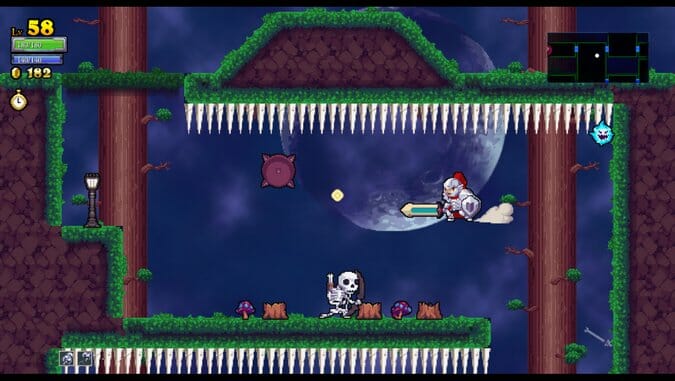
A few hours before I finished Rogue Legacy I found out that my mother had been laid off from her job at an insurance company. (I grew up in Connecticut, where everyone’s mother has a job at an insurance company.) I was struck dumb by the news; with nothing else to do, I hung up the phone and walked to the store to pick up paper towels. On the way, I thought about the professional lives my parents led, eventually permitting by pure cause-and-effect the idiotic but ostensibly successful existence I’ve made my own. Nothing I do is exactly Walk of Fame material, but I have stupid hair, live in New York, can afford a cat and somehow make rent every month. It’s all led up to this.
When learning about something like my mother’s job’s fragility, though, it’s hard not to get stuck looking at the familial decisions, sacrifices and coincidences that have led me to this point—reviewing the latest title from Cellar Door Games, dealing with family problems through writing, knowing what a roguelike is.
Rogue Legacy uses this type of causal, slowly-building view of history as its focal point. It starts with a castle mishap, and it ends with the player’s character resolving the situation. What happens in between consists of hundreds of generations of lives lived in the name of triumphs large and small and failure after failure after failure.
At its core, Rogue Legacy follows a relatively standard roguelike format: Your character enters a difficult, randomly generated dungeon, attempts to navigate it via side-scrolling adventure hack’n’slash similar to that of Castlevania or Ghosts N’ Goblins, and probably dies within a few minutes. After death the player is given a choice between three of the player’s offspring, each of whom is granted a random class and up to three randomly generated traits. The classes are standard RPG fare (the one with lots of HP, the one who’s good at magic, etc), but the traits have unpredictable and often-hilarious effects on that character’s life. ADHD, for example, causes the character to move more quickly. Congenital insensitivity to pain removes her HP meter. Homosexuality, of course, has no bearing on the gameplay at all. Each child is different, and each castle is different—the ease of a given round relies heavily on how well the two complement each other.
At the beginning of a round of Rogue Legacy, a child is able to spend their dead parent’s gold on persistent upgrades such as stat buffs, new equipment and magical runes. Any unspent cash, however, is collected by an evil-looking shadowy figure before actually entering the castle. These repeated shakedowns place a large premium on the amount of gold that’s collected during a given run. As a result, during almost every round of play there’s a moment when a character’s biggest goal (defeating one of the game’s several bosses, for example) is abandoned in favor of hopefully just getting a couple of runes and some money that can be handed down to their son or daughter. Depending on the chosen character’s class and traits, the moment may occur before the castle is even entered, relegating their life to footnote status before it’s really even begun. It’s a quietly sad moment, and something unique to the cumulative, procedural narrative that Rogue Legacy slowly creates.
By the same token, any significant achievement in Rogue Legacy can usually be traced back a few generations to a character who only fought for a few minutes, but who, against the odds, collected just barely enough gold to upgrade something as seemingly insignificant as the amount of weight their daughter could carry. Through this emphasis on lineage and nostalgia, Rogue Legacy has a different relationship to failure and success than just about every videogame in recent memory. It’s a smart and surprisingly affecting use of permadeath, the unpredictable nature of progress in roguelikes, and the short, often-uneventful lives of roguelike protagonists.
The reasons these qualities work so well are related to how, in an oblique way, roguelikes are fairly realistic games. Death is permanent, after all. The nature of progress is unpredictable. Plenty of human lives are short and uneventful, but that doesn’t make them unimportant. Everyone has to deal with the same essential set of challenges, but happenstance changes the details. We make plans, but unpredictability and chaos (i.e., reality) set in and force our hands. The only things that set the latest generation apart from their forebears are pure chance and the foundation of skills and wealth that were left behind for them. On a long enough timeline, a given person seems less like a fully-realized character and more like an iteration of those who came before them.
Rogue Legacy is indicative of how games can uniquely combine interactivity, time and systems to create an emotional effect that’s similar to the ones brought on by a traditional narrative. Cellar Door Games didn’t even need to do anything particularly new mechanically in order to achieve that. Rogue Legacy combines two genres that have existed since the eighties, but its creators noticed strong, heretofore-hidden emotional fault lines in those genres. It’s one of the best games of the year.
Rogue Legacy was developed and published by Cellar Door Games. It is available for the PC.
Joe Bernardi is a writer and web developer living in Brooklyn. His words have appeared in Dusted Magazine, the Boston Phoenix and Tiny Mix Tapes, among other places. He’s got both a Twitter and a blog.
